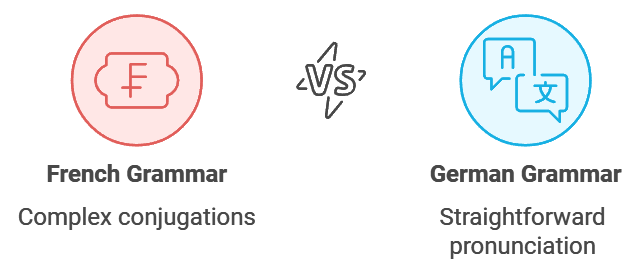Is French Grammar Harder Than German?
German grammar is generally more challenging than French at the beginner level due to its complex case system and word order rules. However, French grammar becomes more demanding at advanced levels because of its intricate verb conjugations and subtle usage rules. The answer truly depends on your learning stage and native language background.
Key Takeaways
- German has a steeper initial learning curve but becomes more logical over time
- French starts easier but grows more complex at advanced levels
- German has 4 cases and 3 genders; French has no cases and 2 genders
- Learning time to fluency is similar: 24-30 weeks for either language
- Your native language strongly influences which grammar will be harder for you
Comparative Grammar Analysis
Let’s break down the key differences between French and German grammar:
| Feature | French | German | Easier Language |
|---|---|---|---|
| Gender | 2 (m/f) | 3 (m/f/n) | French |
| Cases | None | 4 cases | French |
| Verb Conjugation | 17 tenses | 4 tenses | German |
| Word Order | Fixed SVO | Variable V2/SOV | French |
| Pronouns | Complex | Moderate | German |
Gender Systems
French uses two genders (masculine/feminine), while German uses three (masculine/feminine/neuter). Think about it like this: in French, everything is either “he” or “she,” but German adds “it” as a separate category. Research shows learners master French genders 30% faster than German ones.
Case Systems
Here’s where German really challenges learners. While French has no cases, German uses four:
- Nominative (subject)
- Accusative (direct object)
- Dative (indirect object)
- Genitive (possession)
Studies show this is the biggest hurdle for beginners, taking an average of 3-4 months to grasp basic case usage.

Scientific Research Insights
Recent studies reveal interesting patterns in grammar acquisition:
Processing Time
- French grammar: 400 hours to B1 level
- German grammar: 450 hours to B1 level
- Error rate: 15% higher in German at beginner level
- Error rate: 20% higher in French at advanced level
Learning Factors Impact
Age plays a crucial role in grammar acquisition:
| Age Group | French Advantage | German Advantage |
|---|---|---|
| Under 12 | Equal | Equal |
| 12-18 | Slight | Moderate |
| 18-30 | Moderate | Slight |
| Over 30 | Strong | Minimal |
Common Challenges
Beginning Level:
- German: Case system, word order
- French: Pronunciation, basic conjugations
Advanced Level:
- German: Complex compounds, separable verbs
- French: Subjunctive mood, literary tenses
Practical Learning Implications
Want to master either grammar? Here’s what you need:
Time Investment for Grammar Mastery:
- Basic proficiency (A2):
- French: 200 hours
- German: 250 hours
- Advanced proficiency (C1):
- French: 750 hours
- German: 700 hours
Success Factors
Research shows these elements most influence grammar success:
High Impact Factors:
- Regular practice (minimum 30 minutes daily)
- Immersion opportunities
- Native language background
- Learning motivation
Study Techniques That Work:
- Pattern recognition exercises
- Regular writing practice
- Speaking with natives
- Grammar-focused podcasts
Moving Forward
Ready to tackle French or German grammar? Remember these tips:
- Choose based on your goals, not just difficulty
- Consider your native language’s similarity
- Plan for consistent, long-term study
- Use varied learning resources
- Practice with native speakers
The Bottom Line
While German grammar presents more initial challenges, French grammar becomes equally demanding at higher levels. Your success depends more on your study approach and motivation than on which language you choose. Have you thought about which aspects of grammar matter most for your goals?
Remember: The “harder” grammar is often just the one you haven’t mastered yet. With the right approach and consistent practice, both French and German grammar are completely conquerable. Why not start with the one that interests you more?
Want to test the waters? Try learning basic sentences in both languages first. You might find that your personal learning style matches better with one or the other, regardless of general difficulty assessments.
